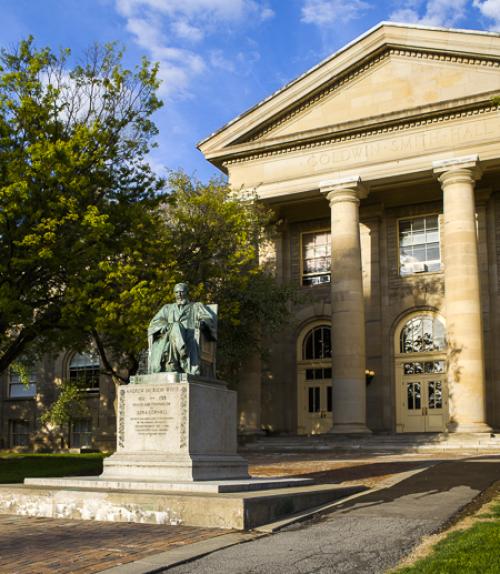Alfred H. Schatz, professor emeritus of mathematics, died at home Oct. 11 after a long bout with Parkinson’s disease. He was 90.
Schatz taught for nearly 50 years at Cornell and was known as an expert in the analysis of finite element methods applied to partial differential equations (PDEs) – in particular superconvergence methods.
These equations are formulas that relate quantities and their rates of change, over time or relative to one another, said Tara Holm, professor of mathematics and chair of the department.
“Such equations are the foundation of science, describing laws of motion, thermodynamics, quantum mechanics and so forth, but solving PDEs is notoriously tricky,” she said, because solutions may not exist or forms may be difficult to write. “Al Schatz was an expert in the finite element method, a numerical technique that allows computers to estimate solutions very quickly.”
He was particularly skilled, she said, at error analysis, determining how close an estimate might be to a real solution; and at identifying superconvergence, “when the estimates converge faster than you might naively expect.”
“Al was not just an insightful mathematician, but also a warm and unpretentious person who was very generous to students and younger colleagues. even when their research interests were significantly different from his own,” said Alexander Vladimirsky, professor of mathematics.
“Al was brimming with ideas. Although he worked on some very technical problems, he was exceptionally able to see through the technicalities to obtain insightful results,” said Alan Demlow, Ph.D. ’02, math professor at Texas A&M University.
Schatz published more than 50 papers, including a series of joint papers with Cornell mathematician Lars Wahlbin on interior maximum norm estimates for finite element methods (FEM). He also published a book, “Mathematical Theory of Finite and Boundary Element Methods,” co-authored with Vidar Thomée of Chalmers University of Technology in Sweden and Wolfgang Wendland of the University of Stuttgart.
In 1997, Schatz was recognized as professor of the year by the Society of Women Engineers, and in 2001 he was the inaugural recipient of the Mathematics Department Senior Faculty Teaching Award, recognizing his contributions in the engineering calculus sequence.
“Al was in essence my co-adviser and a great influence in my career. It was not uncommon to spend three hours in his corner office talking about research, life and the profession – these meetings were so much fun,” said Johnny Guzmán, Ph.D. ’05, a professor of mathematics at Brown University. “While we were at Cornell, one of the major advancements in FEM was the localized pointwise estimates that Al proved.”
During the summer of 1976, David Shmoys took two math classes at Cornell as a rising high school senior, one taught by Schatz.
“Al taught completely fluidly without notes, including many (what I now know to be) nonstandard elements, such as deriving Kepler’s laws of planetary motion from first principles,” said Shmoys, now the Laibe/Acheson Professor of Business Management & Leadership Studies in Cornell Engineering and in the Department of Computer Science. “As the first math class that pushed me to think hard, it was truly a life-changing experience for me.“
Dmitry Leykekhman, Ph.D. ’04, a math professor at the University of Connecticut, said Schatz was generous with his time. “He also was very down-to-earth, and I enjoyed hearing stories from his life told with his characteristic humor – such as being directed to speech therapy when he entered undergraduate studies due to his thick Brooklyn accent,” Leykekhman said.
Louis Billera, emeritus professor of mathematics at Cornell, remembered Schatz as a wonderful colleague with a great sense of humor. “He always treated people with respect, especially those who weren’t part of the male-dominated math world of the late 1960s,” he said. “He maintained his humor throughout his later years in the department, even as his illness progressed.”
Schatz was born in Brooklyn to Eastern European immigrant parents and grew up in Bedford-Stuyvesant. After graduating from City College of New York as a mechanical engineer, he worked at several jobs including as an engineer with Western Union and Republic Aviation.
In his late 20s he returned to school at New York University, where he earned a Ph.D. in mathematics. He did postdoctoral work at Columbia University before taking a position at Cornell in 1966.
Schatz is survived by his former wife, Gisela Wöllmer, and his children, Greg Schatz and Ani Schatz.
The Math Department will host a memorial for Schatz on Dec. 21 and plans are also in the works for a celebration of life. In lieu of flowers, donations may be made to the Tompkins County SPCA.





